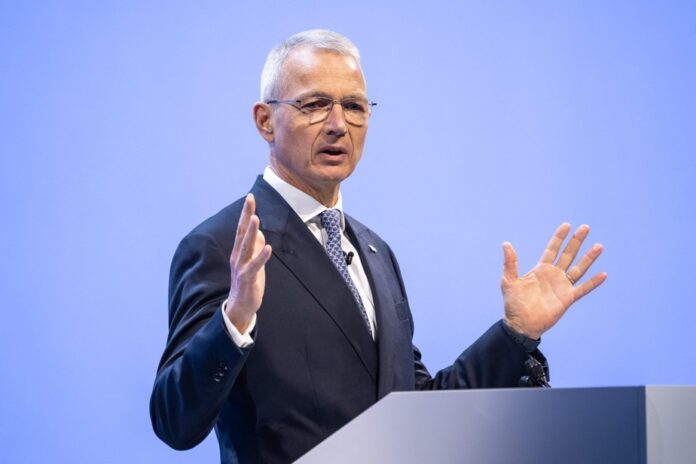(Zurich) Credit Suisse Chairman Axel Lehmann says he is ‘deeply sorry’ for failing to save Switzerland’s second-largest bank, in the face of angry and tearful shareholders whose money went up in smoke .
“I can understand the bitterness, anger and shock of everyone who is disappointed, overwhelmed and affected” by what happened, Lehmann said at the opening of a bank’s last general meeting. of 167 years who helped build the Swiss economic miracle.
It will disappear, bought on March 19 by its rival UBS for 3 billion francs and with the blessing of the Swiss authorities, who feared a total collapse.
“We wanted to put all our energy and effort into turning the situation around. It hurts me that we didn’t have time to do this and in that fateful week in March our plans were thwarted. And for that, I am deeply sorry,” the president said.
And to promise to do everything to ensure “a smooth transition” with UBS.
But these words did not comfort the 1748 shareholders who came in person to express their frustration, their anger, or simply witness this historic moment.
For 5 hours, the shareholders followed one another on the platform to multiply the reproaches, without cries or boos apart from a brief outburst of voices.
“I’m wearing a red tie because I’m red with anger,” the first responder said without breaking his composure. “The stock is barely worth the price of a candy,” quipped one small holder.
Christine Renaudin, a regular at large general meetings in Switzerland, brandished a ten-point code of ethics that she intends to submit to the boss of UBS to lay a sound foundation for the future entity.
Outside, environmental organizations had erected a boat hull – the Crisis Switzerland – depicting the sinking bank.
Quite a symbol for the establishment which, in a few years, has gone from being a global banking giant to one bought for a pittance.
“I lost 10,000 Swiss francs (10,047 euros, editor’s note),” explained Stephan Denzler. “For my family, it’s a lot of money,” he explains, “sometimes I laugh about it, other times I’m very angry.”
“I find it a scandal what the federal government has done with its decision to invoke a state of emergency,” says Albert Keel, who, like everyone else, was deprived of a vote on the takeover. of its bank by the government in the name of the higher interest of the financial centre.
“I bought recently and lost it all of course,” he explains, “a six-figure sum.” He wanted to bet on the success of the restructuring plan presented in the fall by management with “the hope that with the new strategy, the stock market will rise. »
For Jeanne Martin, coordinator of general assemblies at ShareAction – an environmental and social organization which campaigns for responsible investments – it was “important that this general assembly be held to carry the voice of civil society”.
“For us, the challenge is to understand the responsibilities and to ask questions of the board of directors if they investigate the former leaders of this bank who caused this debacle”, said Vincent Kaufmann, director of the Ethos foundation. which represents Swiss pension funds.
Over the course of the scandals, Credit Suisse’s stock had seen its value plummet by 80% in two years, but its fall abruptly accelerated on March 15, losing up to 30% during that session in the face of the loss confidence of investors and lenders.
Despite the derisory price reached by the title, shareholders were only offered the equivalent of 0.76 francs per share, or just 0.59% of its closing value after a chaotic week. in stock exchange.
Credit Suisse’s AGM has barely ended, but attention turns to UBS, which is to hold its AGM on Wednesday in Basel.















